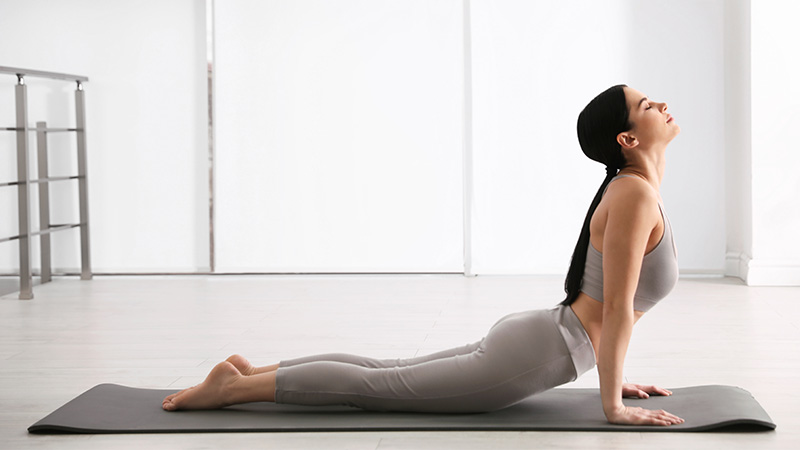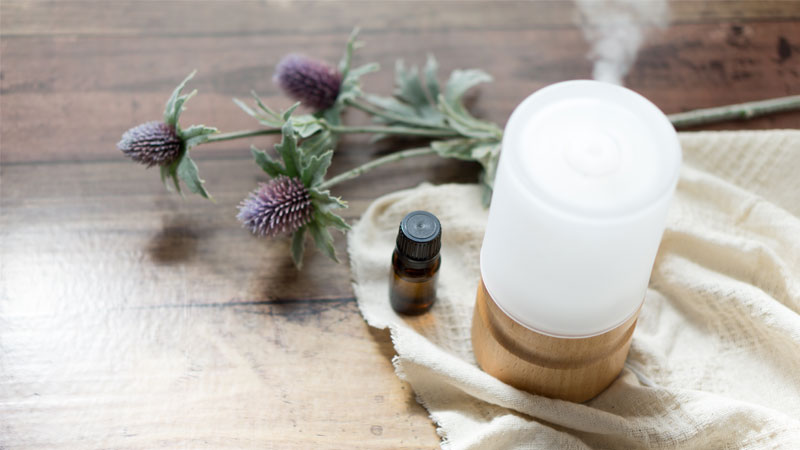Reclaim your 'wild power' over your nervous system

According to Robert Sapolsky, in his book “Why Zebras Don’t Get Ulcers,” when we worry or stress, our body turns on the same physiological responses that an animal’s body does - but we humans don’t seem to be able to turn off the stress-response in the same way – we either fight, flee or do other actions that distract us – when instead we should do what we can to restore our nervous system to balance.
What’s more, in today’s hectic, modern society, we are pretty much living in a constant chronic activation of the nervous system. Stress, deadlines, rush, and the threat of a strange virus that has loomed over us in recent times, has created a society which is really highly complex and challenging to be our wild and natural selves within. This constant over-stimulation can make us feel ill and lead to us developing imbalance in the body. Obviously, that’s not ideal, so we thought we’d invite you into a new way of being in the world, and the invitation to re-wild.
Returning to the wild - learning from how stress is managed in the wild and returning to nature to reclaim our relationship with stress - is one way we can begin to support our nervous systems to restore the calm required to enable us to truly thrive. And of course, in returning to the wild, we can use nature's medicine of aromatherapy as support. So, let's dive into how we can calm and relax our nervous system and reclaim our power over stress.
How does our nervous system work?
Whenever we are triggered into our stress response, our sympathetic nervous system, originating in the brain, is turned on. This is the part of us that responds to emergencies - or what we think of as emergencies – and releases adrenaline and noradrenaline (or epinephrine and norepinephrine), which kick the body’s organs into action. The sympathetic nervous system speeds the heart up, diverts blood to muscles, and generally prepares you for fight, flight or freeze mode. We are so often in this space of a switched-on nervous system.
The parasympathetic nervous system, on the other hand, opposes this – creating calm – it slows the body down. So, we will be focusing our healing here, encouraging the parasympathetic nervous system to soothe with the practices that follow.
One thing that often holds us back, in many cases, is a sense of learned helplessness – the idea that our state of stress and calm are ‘outside’ of our creation. And yet, they aren’t. We can transform any state we are in and reclaim our power. An important step in reclaiming our nervous system, therefore, is seeing that we have the capacity to change anything – including our response to stressors.
An enquiry practice for transforming your nervous system
It’s important, therefore, as a first enquiry, to firstly begin to accept that this stress-response, whilst automatic in response to your thinking about a stressor, is really also an invitation into deeper tending. Seeing that you can do things to begin to settle and calm an automatically roused nervous system will do wonders for restoring balance.
To begin this, you can start to really notice what is going on in your body - I invite you to begin journaling about your own personal symptoms of stress; they all express individually. Take some time to notice in everyday life where you’re feeling “off” in your body, and what is triggering you. It might be that a lot of things trigger you – we are actually pretty sensitive souls, us humans, when we listen in fully – and so part of this noticing practice is to begin to bring loving awareness to what’s happening within your body.
Whenever you notice yourself in the stress response, I’d invite you to diffuse this blend of essential oils to soothe your nervous system:
- Mix 3 drops Bergamot, 2 drops Geranium and 2 drops Chamomile in water in a candle burner or electrical aromatherapy diffuser and do some deep breathing for 10 minutes.
These essential oils all have excellent calming and relaxing properties and are wonderful for soothing the nervous system – especially Bergamot and Chamomile.
As you begin to notice more, you might be surprised that, sometimes, even things that we don’t realise can cause us to feel stress – for example, not drinking enough can tell the body it’s short on water. Symptoms of a stressed nervous system can include anything from lack of appetite, to over-eating, disruption of the menstrual cycle, ulcers and inhibited immune function, or things like depression (which can be your body’s way of numbing). The body feels the stress response and acts accordingly, so even just noticing how it expresses in your own body is the first step into soothing the nervous system as it offers you choice as to what to do about it. That, along with this beautiful essential oil blend is a powerful first step into reclaiming your power.
What can we learn from the wild?
In “Waking the Tiger” by Peter Levine, he proposed that the human animal is a unique being in that we don’t discharge our nervous energy in the same way as wild animals do. We shared a bit about his methods in the “Essential Oils for Post-Traumatic Stress Disorder” blog. He describes “the key to healing traumatic symptoms in humans lies in our being able to mirror the fluid adaptation of wild animals” as they pass through the stress response to heal. He believes that, unlike animals, our stressed energy gets frozen in our nervous systems, and that this needs to be discharged.
A practice for discharging nervous energy
The second invitation, therefore, is a return to the wild in terms of discharging any nervous energy via movement practice.
As you begin to notice your stress response more with the first enquiry practice, you’ll then start to want to transform it. The next step of this is to create some form of body led movement practice - whether yoga, dancing, shaking or anything that feels like it is discharging your stress energy. Do 10 minutes of this whenever you begin to notice yourself feeling stressed.
Use this essential oil blend to support this practice:
- Mix a blend of 3 drops Lemongrass, 2 drops Ylang Ylang and 1 drop Lavender in 15ml Grapeseed oil and massage into your body in a direction towards the heart. Make this a beautiful ‘destress’ ritual by being very conscious about the reason for doing it, and affirming “I am discharging nervous energy from my body and reclaiming my nervous system”. Once you are fully covered in oil, dance, shake and move!
Lemongrass oil is a powerful nervous-system restorer, great for stress-related exhaustion, whilst also being extremely uplifting, so this is perfect for this stage of reclaiming your power over stress! Ylang Ylang is excellent for treating nervous tension, and Lavender is generally relaxing, so you’re in good hands with these oils.
Using essential oils to reclaim your power over stress
Of course, we have learned from the wild that we need to shake, and begun to see ourselves as human animals, who require some tending and nurturing – especially in a world that is no longer as wild as it was. And a huge part of our wild reclamation over our nervous system is integrating essential oils into our everyday life. This is quite literally bringing nature into our bodies.
My Top 10 essential oils for calming and soothing the nervous system are:
- Bergamot
- Lemongrass
- Neroli
- Lavender
- Rose
- Clary Sage
- Sandalwood
- Patchouli
- Valerian
- Vetivert
Soothing your nervous system with essential oils
So, with these oils in mind, your next invitation into a practice involves using your intuition to really tune into what your nervous system needs in each fresh moment. Your body is clever, and it will let you know which essential oils it desires, via your sense of smell – you’ll be drawn to specific oils in different moments, and different ways of using them, too. Let yourself be guided by your body on this, and this will help you reclaim your relationship with your nervous system too.
Here are ways to use your oils along with suggested blends (remember you can substitute the oils for an alternative of your choice, as long as you keep the number of drops to the carrier ratio the same):
- Bath Blend: Mix 3 drops Rose, 2 drops Clary Sage and 1 drop Neroli in 15ml Bath Oil or Shower Gel, and add this mixture to your warm flowing bath water. Sit in your cauldron of relaxation and breathe your stresses away.
- Spritz Spell: Mix 15 drops Lemongrass, 10 drops Sandalwood and 5 drops Patchouli in 100ml of Orange Flower (Neroli) or Rose Hydrolat and use as a soothing spritz as required.
- Diffusion Blend: Mix 2-3 drops of each of your favourite three essential oils and diffuse at the time you’re likely to feel most in need of soothing. A beautiful blend is 3 drops Bergamot, 2 drops Rose and 2 drops Patchouli mixed in water in a candle burner or electrical diffuser.

You may also wish to add in some healing, therapeutic essential oils for soothing specific symptoms of the nervous system. For example, for the symptoms we highlighted earlier, these might be helpful:
- Lack of appetite – Spearmint is a great oil for digestive disturbance, and is a little gentler on the nervous system than Peppermint.
- Over-eating – Grapefruit is wonderful for nervous exhaustion, whilst also helping to curb an appetite due to stress.
- Disruption of hormones and the menstrual cycle – Geranium and Rose are great for nervous disorders, but are also outstanding hormonal balancers.
- Ulcers – Lemongrass is a great nervous system balancer and is said to be good for stomach ulcers (never ingested, only diffused or used in a blend on the skin).
- Inhibited immune function – Sweet Orange is a beautiful oil to stimulate and balance the immune system, as well as being relaxing.
- Depression – Rose is a powerful and beautiful anti-depressant, helping process emotional issues, and soothing the nerves.
Overall, I’d encourage you into the practice of choosing how you want your nervous system to be – the more you can reclaim your nervous system by being more conscious and bringing it back to balance when you can, the easier you’ll find it becomes to manage your stress.
You have the power to bring your nervous system back to balance; rewild yourself and you’ll be feeling calmer with each action you take.
Nicole Barton
Consultant Aromatherapist
Read other articles by Nicole Barton




